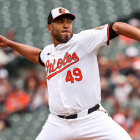
Back in 2017, Giancarlo Stanton, then with the Marlins, made a run at 60 home runs. He finished with 59. It was incredibly fun. Well, the on-field stuff was fun. Listening to a bunch of people attempt to re-litigate history was a bit burdensome, relatively speaking. I bring this up now because it's happening again. Stanton's current Yankees teammate, Aaron Judge, has 57 home runs with three weeks remaining in the season.
Again, it's incredibly fun. And, again, there's a swell of "real home run record" talk, and pointing out that the other single-season leaders reached their heights during baseball's "steroid era." It's louder this time around, since Judge plays in New York and that's just the way things go.
So it seems like we need to have a talk. Again. Back on Aug. 25, 2017, we had a talk about this. I'm a bit more mellow now as I've aged, so I won't be quite as mean, but I'll lay out essentially the same argument that I did then.
The real single-season home run record is 73. Barry Bonds hit 73 home runs in 2001. Mark McGwire hit 70 in 1998. Sammy Sosa hit 66 in 1998. McGwire hit 65 in 1999, while Sosa hit 63. Sosa also hit 64 in 2001.
Those things all happened. They are in the record books. Every single time we here at CBS Sports mention the reality that these things all happened, a litany of fans on social media complain that we listed them. Apparently, I'm supposed to just arbitrarily decide which numbers count and exclude the ones that shouldn't? It's flattering that these people think I have that sort of power. Alas, I do not. The numbers are the numbers and they happened. They are reality.
Back in 2017, I presented the following, admittedly abrasive argument:
To start, some math. Here's a first-grade-level problem for you:
<, > or =
73 ____ 61
The correct answer is >. Seventy-three is greater than sixty-one.
Yeah, that's kind of mean (I told you!). It's also 100 percent true.
There's a movement that if Judge hits his 62nd home run this season, it'll be the "real" home run record. It's just not true. The real record is 73. You might wish it didn't happen, but it did.
This is about the time someone replies with a needle emoji or something -- which, I might add, is impressively creative and original and everyone who does it should be so proud of themselves -- so, in fairness to those people, we'll discuss the situation.
Let's talk about context.
There's always context behind numbers.
During the so-called "steroid" or "PED" era in Major League Baseball, offensive numbers exploded. Several factors contributed to said explosion, but the one that sticks out the most for so many people is that Major League Baseball wasn't testing for performance-enhancing drugs and a good number of players were pumping themselves up with them. The league has been testing since 2005, so everyone now, in theory, is to be considered "clean."
These facts colliding with the fact that all six of the individual seasons with more than 61 home runs happened in 1998, 1999 and 2001 clear the way for the PEDs as an easy scapegoat. Here's what I said in 2017:
You think (or claim to know) Barry Bonds juiced. OK. The league wasn't testing for anything and many others were juicing, too. This isn't to justify it from a moral standpoint or anything, it just is what it is. There wasn't a testing program in place and we don't know who was doing what. We do know that Barry Bonds hit 73 home runs in 2001. That's a fact.
It was a bad era for baseball in the long run (but great for baseball in the short run, by the way) in the minds of many, but it happened. You don't get to just erase the history books.
If you wanted to get into erasing history, we'd have to keep going.
In 1961, Roger Maris hit 61 home runs. It was an expansion year, so the product was more watered down than in previous seasons. Also, the AL schedule expanded to 162 games (the NL stayed at 154 until 1962). With that context, do we need to ding Maris a bit? All the stars aligned pretty well for his career year to get him to exactly 61 home runs. Rather convenient, no?
If we did penalize Maris, even slightly, it's onto Babe Ruth and his 60 homers in 1927. Only the league wasn't integrated yet. Can we really say the "real" home run record came in a league that didn't allow players of color?
If we're gonna start throwing asterisks on numbers, every single 60-homer season in history has one.
Look, I understand that there are many people offended by the "steroid era" and want the players to be clean. That's perfectly fair. I'm pretty offended by the league not allowing players based upon skin color when Ruth played, but there's really nothing we can do about right now in terms of the numbers he put up. They happened.
So did the "PED"-era numbers.
Circumstances evolve over time. As I said in 2017, "there are things that skew numbers. In baseball, some of those circumstances are integration, expansion, ballpark dimensions changing, the ball being wound more tightly or less tightly, the pitcher's mound height changing, the advent of the designated hitter, reliever specialization and a laundry list of other changes."
More:
With those things, stats are going to change over the course of generations. We're never going to see a pitcher win 511 games again, so Cy Young has the all-time wins record. Did you know Cy Young also has the record with 749 complete games? Even the best pitchers nowadays won't get to 75 career complete games. That's still the record. We shouldn't just start erasing the history of complete games in order for Clayton Kershaw to have a shot at the new "record."
Now, I understand there's a difference in the minds of the people who would say the "real home run record" is 61. They would argue that the "PED" era stained baseball and the numbers should be wiped from the record books. Again, I'd point out racist segregation was a worse stain on baseball, but I'll just stick with the current line of thinking. Someone last time around likened the hopeful erasure of "PED" era numbers to how college sports vacate titles or awards in the face of scandals.
First off, I always find vacating amusing. I mean, just to focus on one team, I watched USC win the national title in 2004 college football. Reggie Bush won the Heisman Trophy the next year. I saw him holding the trophy and everything. It happened. I'm certain of it! Vacating these things doesn't negate what our eyes told us at the time. It doesn't erase the experiences of those involved. It all happened.
Anyway, MLB hasn't even done this with any "steroid era" numbers. So if this is your argument, it's pretty weak. You can argue MLB should vacate the numbers, I suppose, but it hasn't. Even if the league did, such an action wouldn't change the experiences we had in those years and it's an awfully slippery slope to vacate numbers in this fashion, especially since -- to reiterate -- the league wasn't even conducting any testing.
We hold the intellectual capacity to note context in situations in so many different walks of life. We can apply that to Judge's chase of 60-plus home runs. First of all, 61 is still the AL record, so there's that. Judge can set the American League record for home runs. If you're one of the people who really hates the numbers from the 1998-2001 seasons, by all means, believe that Judge has the "clean" record, should he get to 62. It's your right.
What you don't get to do is proclaim what is "real" and what isn't. Barry Bonds hit 73 home runs in 2001. That's the single-season home run record. You don't have to like it, and maybe it hurts your feelings, but it's a fact. It happened.






















